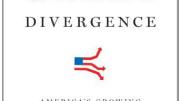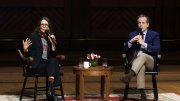Timothy Noah ’80, then of Slate (and now at The New Republic), set out to document and understand a new, and unsettling, state of affairs that has finally attracted wide attention—in part reflecting his work. He has now recast his series of prize-winning reports into book form as The Great Divergence: America’s Growing Inequality Crisis and What We Can Do About It (Bloomsbury Press, $27). From the introduction:
As late as 1979, the prevailing view among economists was that incomes in any advanced industrial democracy would inevitably become more equal or remain stable in their distribution. They certainly wouldn’t become more unequal. That sorry fate was reserved for societies at an earlier state of development or where the dictatorial powers of the state preserved privilege for the few at the expense of the many. In civilized, mature, and free nations, the gaps between rich, middle class, and poor did not increase.
That seemed the logical lesson to draw from U.S. history. The country’s transformation from an agrarian society to an industrial one during the late nineteenth and early twentieth centuries had created a period of extreme economic inequality—one whose ramifications can still be glimpsed by, say, pairing a visit to George Vanderbilt’s 125,000-acre Biltmore Estate in Asheville, North Carolina, with a trip to the Tenement Museum on Manhattan’s Lower East Side. But from the early 1930s through the early 1970s, incomes became more equal, and remained so, while the industrial economy lost none of its rude vitality. As the 1970s progressed, that vitality diminished, but income distribution remained unchanged.…Starting in 1979, incomes once again began to grow unequal. When the economy recovered in 1983, incomes grew even more unequal. They have continued growing more unequal to this day.
The United States is not the only advanced industrialized democracy where incomes have become more unequal in recent decades. The trend is global.…But the level and growth rate of income inequality in the United States [have] been particularly extreme.
There are various ways to measure income distribution, and by all of them the United States ranks at or near the bottom in terms of equality.…As of 2007 (i.e., right before the 2008 financial crisis), America’s richest 1 percent possessed nearly 24 percent of the nation’s pretax income, a statistic that gave new meaning to the expression “Can you spare a quarter?” (I include capital gains as part of income….) In 2008, the last year for which data are available, the recession drove the richest 1 percent’s income share down to 21 percent. To judge from Wall Street’s record bonuses and corporate America’s surging profitability in the years following the 2008 financial crisis, income share for the top 1 percent will resume its upward climb….We already know from census data that in 2010 income share for the bottom 40 percent fell and that the poverty rate climbed to its highest point in nearly two decades.









